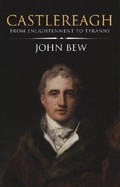The words "enlightenment", "war", and "tyranny" in your subtitle stand out. How do these words play out in your book?
John Bew: The three words capture the span of Castlereagh's career and also the contradictions within it. Castlereagh is often painted as a reactionary or counter-revolutionary figure by his enemies and one of my central aims was to show that this was an unfair caricature. Rather than being anti-Enlightenment or tyrannical, his career reflected the complexities of the European Enlightenment. He grew up in an area of Ireland where there was a strong tradition of Enlightenment thinking and his family was closely connected to the philosopher Francis Hutcheson. He read much of the same literature as the French Revolutionaries (such as Rousseau) and began his life as a self-confessed 'man of the people'.
After 1790, however, Castlereagh grew more sceptical and conservative. Initially, he was receptive to the ideas of the French Revolution but, following two visits to Paris – in 1790 and 1791 – he was alarmed by the effects of the revolution. What he saw across France confirmed to him that older identities (national, religious, ethnic) were stronger than some of the most enthusiastic revolutionaries recognised. He feared that the anarchy of revolution was likely to unleash rather less enlightened forces such as sectarianism. This is the chief lesson he took back to Ireland and led to his opposition to the radical republican movement and the rebellion of 1798, which he was involved in putting down.
So the book begins with the phase of 'enlightenment', the moves into the phase in which he was a minister in the government in London responsible for the conduct of the war. Of all the ministers who served in this period, no other was so centrally involved in the war effort from start to finish. Castlereagh was William Pitt's protégé but Pitt died in January 1806. Most important of all, Castlereagh was Wellington's chief sponsor. In fact, it's fair to say that without Castlereagh, you never would have had the Duke of Wellington and the whole course of European history may have looked different.
The final section deals with the post-war period, when Castlereagh's opposition to parliamentary reform cemented his reputation as a tyrant. By this stage, he was exhausted and over-worked and his responses to economic difficulty and political unrest was increasingly unimaginative. It was the pressure from this phase of his life which led to his suicide.
You seem to have a particular interest in British history and the issue of identity (a hot topic in the UK at the moment). As an Irish peer serving in the London parliament, "a serviceable slave to [his] country" (as one reviewer described his approach), does Castlereagh stand out as a particular case in point for the issues surrounding what it means to be British, to feel a sense of British identity?



